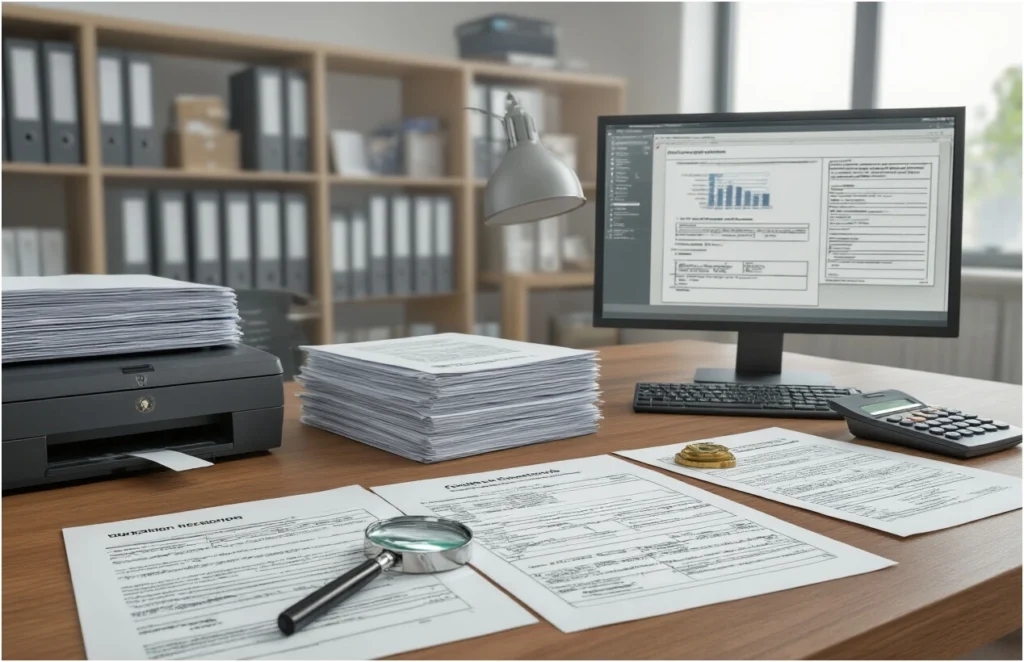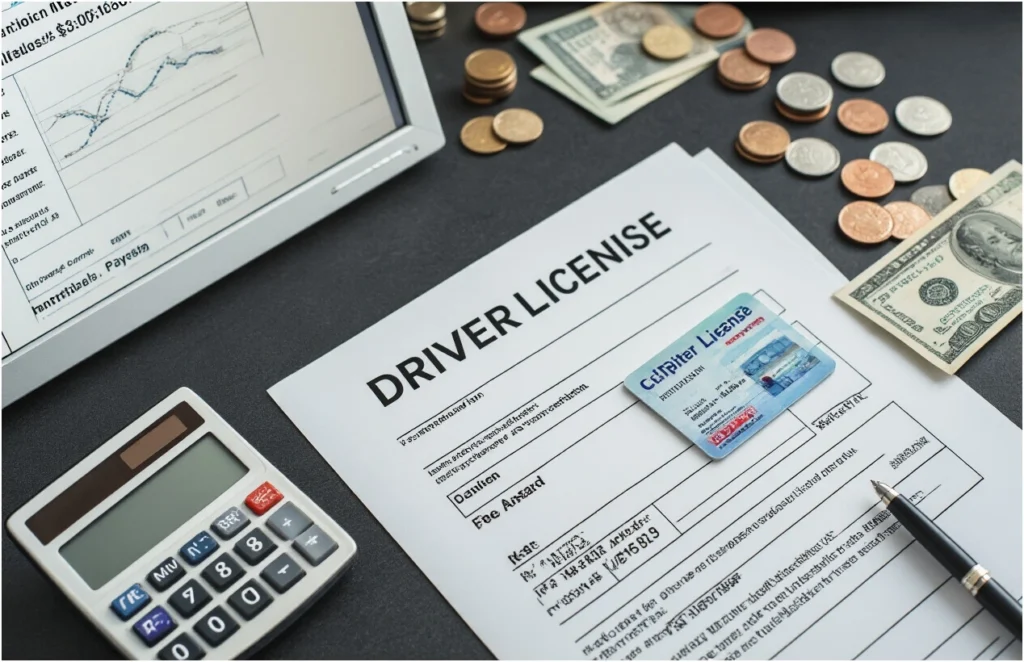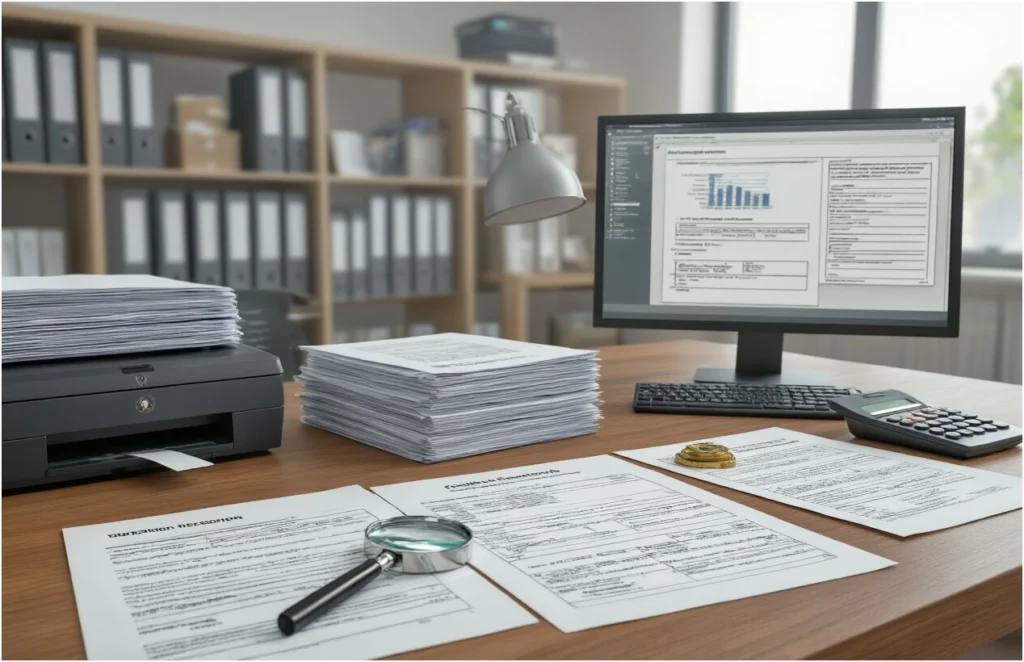Driving License Issuance Management System Fee Structure 2025The Driving License Issuance Management System Fee Structure 2025 brings updated costs and payment options for anyone applying for or renewing their driving license this year. This guide is designed for new drivers, license renewal applicants, commercial vehicle operators, and anyone curious about the current fee breakdown.DLIMS Fee Structure 2025

Getting your driving license now involves multiple digital processing steps, each with specific costs that vary by license type and state requirements. The new system includes technology upgrades and streamlined verification processes that affect overall pricing.
We’ll break down the application processing fees you can expect to pay, from basic documentation to final license issuance. You’ll also learn about testing and examination costs, including written tests, road tests, and any retake fees. Finally, we’ll cover the digital infrastructure charges that support the new online application system and explain how these technology fees impact your total cost.
Regular License
The fee are applicable for one year
| Category | Test Fee | Fee After Passing Test | Courier Fee | Total Fee (Excluding Test Fee) |
| M/Cycle | Rs. 50 | Rs. 450 | Rs. 480 | Rs. 930 |
| Rickshaw | Rs. 100 | Rs. 400 | Rs. 480 | Rs. 880 |
| Car/Jeep | Rs. 150 | Rs. 1350 | Rs. 480 | Rs. 1830 |
| Tractor Agri | Rs. 50 | Rs. 950 | Rs. 480 | Rs. 1430 |
| Tractor Commercial | Rs. 100 | Rs. 1400 | Rs. 480 | Rs. 1880 |
| LTV | Rs. 150 | Rs. 1850 | Rs. 480 | Rs. 2330 |
| Invalid Carriage | Rs. 0 | Rs. 0 | Rs. 480 | Rs. 480 |
| M/Cycle+Car/Jeep | Rs. 200 | Rs. 1350 | Rs. 480 | Rs. 1830 |
| M/Cycle+LTV | Rs. 200 | Rs. 1850 | Rs. 480 | Rs. 2330 |
- Candidate can make regular license for the period of 1 year, 2 years, 3 years, 4 years, or 5 years max
- In any combination the fee of highest fee category will be applicable
Fee Structure
Regular License Renewal
| Category | Renewal Fee (1 Year) | Fine (1 to 3 M) | Fine (3 M to 1 Y) | Fine (1 Year) | Courier Fee | Total (without fine) |
| M/Cycle | Rs. 450 | Rs. 225 | Rs. 450 | Rs. 1125 | Rs. 480 | Rs. 930 |
| Tractor Commercial | Rs. 1400 | Rs. 700 | Rs. 1400 | Rs. 3500 | Rs. 480 | Rs. 1880 |
| Rickshaw | Rs. 400 | Rs. 200 | Rs. 400 | Rs. 1000 | Rs. 480 | Rs. 880 |
| Car/Jeep | Rs. 1350 | Rs. 675 | Rs. 1350 | Rs. 3375 | Rs. 480 | Rs. 1830 |
| M/Cycle+M/Car | Rs. 1350 | Rs. 675 | Rs. 1350 | Rs. 3375 | Rs. 480 | Rs. 1830 |
| Agriculture | Rs. 1350 | Rs. 675 | Rs. 1350 | Rs. 3375 | Rs. 480 | Rs. 1830 |
| LTV | Rs. 1850 | Rs. 925 | Rs. 1850 | Rs. 4625 | Rs. 480 | Rs. 2330 |
| M/Cycle+LTV | Rs. 1850 | Rs. 925 | Rs. 1850 | Rs. 4625 | Rs. 480 | Rs. 2330 |
| LTV + PSV | Rs. 1850 | Rs. 925 | Rs. 1850 | Rs. 4625 | Rs. 480 | Rs. 2330 |
| M/Cycle+LTV+Trac Com | Rs. 1850 | Rs. 925 | Rs. 1850 | Rs. 4625 | Rs. 480 | Rs. 2330 |
| HTV | Rs. 1850 | Rs. 925 | Rs. 1850 | Rs. 4625 | Rs. 480 | Rs. 2330 |
| M/Cycle+PSV | Rs. 1850 | Rs. 925 | Rs. 1850 | Rs. 4625 | Rs. 480 | Rs. 2330 |
| HTV + PSV | Rs. 1850 | Rs. 925 | Rs. 1850 | Rs. 4625 | Rs. 480 | Rs. 2330 |
| Tractor Agri | Rs. 980 | Rs. 475 | Rs. 950 | Rs. 2375 | Rs. 480 | Rs. 1430 |
| Invalid Carriage | Free | Free | Free | Free | Rs. 480 | Rs. 480 |
- If a person apply for renewal of driving license and original license is not available than duplicate fee will be added.
- In any combination the fee of highest fee category will be applicable
Fee Structure
Duplicate License
| Category | Duplicate Fee | Courier Fee | Total |
| M/Cycle | Rs. 100 | Rs. 480 | Rs. 580 |
| Tractor Commercial | Rs. 100 | Rs. 480 | Rs. 580 |
| Rickshaw | Rs. 100 | Rs. 480 | Rs. 580 |
| Car/Jeep | Rs. 150 | Rs. 480 | Rs. 630 |
| M/Cycle+M/Car | Rs. 200 | Rs. 480 | Rs. 680 |
| Agriculture | Rs. 200 | Rs. 480 | Rs. 680 |
| LTV | Rs. 150 | Rs. 480 | Rs. 630 |
| M/Cycle+LTV | Rs. 200 | Rs. 480 | Rs. 680 |
| LTV + PSV | Rs. 200 | Rs. 480 | Rs. 680 |
| M/Cycle+LTV+Trac Com | Rs. 200 | Rs. 480 | Rs. 680 |
| HTV | Rs. 200 | Rs. 480 | Rs. 680 |
| M/Cycle+PSV | Rs. 200 | Rs. 480 | Rs. 680 |
| HTV + PSV | Rs. 200 | Rs. 480 | Rs. 680 |
| Tractor Agri | Rs. 200 | Rs. 480 | Rs. 680 |
| Invalid Carriage | Free | Rs. 480 | Rs. 480 |
- In any combination the fee of highest fee category will be applicable
Overview of Digital License Management System Costs

Basic system implementation fees
The upfront investment for establishing a digital license management system ranges from $2.5 million to $8 million, depending on the population size and complexity requirements. State agencies typically allocate $50-150 per capita for initial system deployment, which covers core software licensing, hardware procurement, and security infrastructure setup.
Key implementation components include database architecture development ($800,000-$1.2 million), user interface design and testing ($400,000-$600,000), and cybersecurity measures ($300,000-$500,000). Cloud-based solutions often reduce initial costs by 30-40% compared to on-premises installations, though they shift expenses to ongoing operational budgets.
Annual maintenance and support charges
Digital license systems require consistent maintenance investments averaging $450,000-$750,000 annually for mid-sized state operations. This covers software updates, security patches, technical support, and system monitoring services.
Typical annual expenses break down as follows:
- Software licensing renewals: $180,000-$280,000
- Technical support contracts: $120,000-$200,000
- Security monitoring and updates: $80,000-$150,000
- System performance optimization: $70,000-$120,000
States processing over 500,000 license applications yearly often see maintenance costs scale up to $1.2-$1.8 million annually. Vendor support agreements usually include 24/7 helpdesk access, emergency response protocols, and quarterly system health assessments.
Integration costs with existing government databases
Connecting new license management systems with established government databases represents a significant expense category, typically ranging from $1.2-$3.5 million per state implementation. Integration complexity varies based on the number of existing systems and data standardization levels.
Common integration points include:
- Motor vehicle records: $200,000-$400,000
- Criminal background check systems: $300,000-$500,000
- Social Security Administration databases: $150,000-$300,000
- Immigration status verification: $250,000-$450,000
- Court records and traffic violations: $180,000-$350,000
Legacy system compatibility often drives up integration costs, with older mainframe systems requiring custom middleware development. Data migration from existing platforms adds another $100,000-$300,000 to project budgets, depending on record volume and data quality requirements.
Staff training and certification expenses
Workforce preparation for digital license management systems demands substantial investment in training programs and certification processes. State agencies typically budget $850-$1,400 per employee for comprehensive training initiatives, covering both technical skills and customer service protocols.
Training program components include:
- Initial system operation training: 40-60 hours per employee
- Advanced troubleshooting workshops: 20-30 hours per technical staff
- Customer service adaptation: 25-35 hours per front-line worker
- Security and compliance protocols: 15-25 hours per all staff
Certification requirements often mandate ongoing education, with annual refresher courses costing $200-$400 per employee. Specialized roles like system administrators require additional certification investments of $2,000-$4,500 per position, including vendor-specific training programs and professional development opportunities.
Application Processing Fee Breakdown

New License Application Charges
Getting your first driving license involves several mandatory fees that vary depending on your license category and state regulations. The base application fee typically ranges from $35 to $75, covering initial paperwork processing and administrative costs. Most states charge an additional $15 to $25 for the learner’s permit, which you’ll need before taking your road test.
Commercial Driver’s License (CDL) applications carry higher fees, usually between $75 to $150, reflecting the more complex evaluation process. Motorcycle license applications generally cost $20 to $40 on top of regular license fees. Some states bundle certain services, while others itemize each component separately.
Enhanced or REAL ID-compliant licenses add $25 to $50 to your total cost due to additional security verification requirements. Background check fees, where applicable, can add another $10 to $20 to your application.
Processing times directly impact costs too. Standard processing typically takes 7-14 business days, while expedited services cost an extra $25 to $50 but reduce wait times to 2-3 business days. Rush processing for emergency situations can cost up to $100 additional but delivers results within 24-48 hours.
License Renewal Processing Costs
Renewal fees generally cost less than initial applications since much of your information already exists in the system. Standard renewal fees range from $25 to $50 for regular driver’s licenses, with most states offering 4-8 year validity periods.
| License Type | Standard Renewal | Extended Validity | Online Discount |
| Regular DL | $25-50 | $45-85 | 10-15% off |
| CDL | $50-85 | $90-140 | 5-10% off |
| Motorcycle | $15-35 | $25-55 | 15-20% off |
Early renewal options allow you to renew up to 6 months before expiration, usually at the same cost as regular renewal. Late renewals after expiration carry penalty fees ranging from $10 to $25, depending on how long your license has been expired.
Online renewal systems offer convenience and often provide small discounts of $2 to $5. However, not all license types qualify for online renewal – CDLs and licenses requiring vision tests typically need in-person visits.
Senior citizens often receive discounted renewal rates, with some states offering reduced fees or longer validity periods for drivers over 65. Military personnel frequently get fee waivers or significant discounts on renewal processing.
Duplicate License Issuance Fees
Lost, stolen, or damaged licenses require replacement through the duplicate issuance process. Standard duplicate license fees range from $15 to $35, making them significantly cheaper than full applications since no testing is required.
The replacement process varies by reason:
- Lost licenses: Standard duplicate fee applies
- Stolen licenses: May require police report filing, no additional fee
- Damaged licenses: Must surrender old license, standard fee applies
- Name changes: Requires documentation, may cost $5-10 extra
Temporary paper licenses are often issued immediately for $5 to $10 while your permanent replacement is processed. These temporary documents typically remain valid for 30-45 days, giving you legal driving privileges during the replacement period.
Multiple duplicate requests within a short timeframe may trigger additional scrutiny or higher fees. Some states limit duplicate issuances to prevent potential fraud, charging progressively higher fees for subsequent replacements within the same year.
Emergency duplicate services cost $20 to $40 extra but provide same-day or next-day service. These are particularly useful for travelers or people who need immediate proof of license for employment or other urgent matters.
Digital wallet integration in some states now allows temporary license display on smartphones while awaiting physical replacement, though this service may carry a small technology fee of $2 to $5.
Testing and Examination Fee Structure

Written Test Administration Costs
The written examination component requires a standardized fee of $35 across all license categories. This covers computer-based testing infrastructure, question bank maintenance, and automated scoring systems. Rural testing centers may add a $5 surcharge to account for limited facility availability and higher operational costs.
Digital testing platforms have streamlined the process, but administrative overhead remains significant. The fee includes multilingual support for tests available in Spanish, French, and other regional languages. Accommodations for disabilities, such as extended time or audio assistance, don’t carry additional charges.
Testing centers operating during extended hours charge a $10 premium for appointments scheduled after 6 PM or on weekends. The system allows unlimited practice sessions through the official portal at no extra cost, helping candidates prepare effectively before their paid examination.
Practical Driving Test Fees
Road testing fees vary by vehicle class and complexity. Standard passenger vehicle tests cost $45, while motorcycle endorsements require $55 due to specialized equipment and safety protocols. Commercial vehicle testing commands higher fees ranging from $75 to $125, depending on the class and endorsements needed.
Third-party testing providers offer competitive rates, often 15-20% lower than state-operated facilities. These authorized vendors maintain identical standards while providing more flexible scheduling options. The fee structure includes vehicle inspection, route assessment, and comprehensive evaluation documentation.
Specialized testing for vehicles with adaptive equipment incurs a $25 additional charge. This covers extra time requirements and specialized examiner certification. Group testing discounts apply for driving schools bringing five or more candidates, reducing individual costs by $10 per test.
Retesting Charges for Failed Attempts
Failed candidates face escalating retesting fees designed to encourage thorough preparation. The first retest maintains the original fee structure, allowing immediate rescheduling without penalty. Second attempts incur a 25% surcharge, while third and subsequent retests carry a 50% premium.
Mandatory waiting periods apply between attempts. Written test failures require a 24-hour cooling-off period, while practical test retakes need a minimum seven-day gap. This policy reduces testing center congestion and gives candidates adequate preparation time.
The system tracks failure patterns to identify common weak areas. Candidates failing three times must complete additional training requirements before further testing eligibility. Approved driving schools offer refresher courses at discounted rates for repeat test-takers.
Special Endorsement Examination Fees
Specialized endorsements carry premium pricing reflecting their complexity and limited examiner availability. Hazmat endorsements cost $95, including background check processing and security clearance verification. School bus endorsements require $65, covering child safety protocols and specialized vehicle operation training.
Passenger transport endorsements cost $55, while air brake certifications add $40 to any commercial license test. These specialized areas require certified examiners with additional training, justifying the higher fee structure.
Combination endorsements receive modest discounts when tested simultaneously. Taking hazmat and passenger endorsements together saves $15 compared to separate testing sessions. The system encourages comprehensive testing to reduce administrative overhead and examiner scheduling conflicts.
Document Verification and Processing Charges

Identity verification service fees
Getting your identity verified through the digital license management system comes with specific costs that vary based on the verification method chosen. Basic identity verification using government databases costs $12-15 per application. This covers cross-referencing your personal details with national identity records and social security databases.
Advanced biometric verification adds another $8-10 to your total cost. This service includes fingerprint scanning, facial recognition matching, and retinal scan verification where available. The biometric data gets stored securely in encrypted formats and helps prevent identity fraud throughout the license validity period.
Real-time verification services, which provide instant results within 2-3 minutes, carry a premium charge of $5 additional to standard verification fees. Standard verification typically takes 24-48 hours and costs less, making it the preferred choice for non-urgent applications.
Medical certificate processing costs
Medical fitness certificates require processing through certified healthcare providers integrated with the license management system. The processing fee structure includes several components that applicants need to understand.
Initial medical certificate upload and validation costs $6 per submission. This covers automated health record verification and basic medical data processing. Healthcare providers must submit certificates in standardized digital formats, and any format conversion services add $3 to the total cost.
Specialized medical assessments for commercial vehicle licenses carry higher processing fees. Vision testing verification costs $4, hearing assessment processing adds $3, and cardiovascular fitness validation requires an additional $5. These specialized assessments ensure drivers meet specific health standards for different license categories.
Medical certificate renewal processing offers slight discounts for existing license holders. Renewal processing costs $4 instead of the standard $6, reflecting reduced verification requirements for previously validated certificates.
Background check and security clearance charges
Comprehensive background verification involves multiple security databases and law enforcement records. Standard background checks cost $18-22 depending on the scope of verification required. This includes criminal record searches, traffic violation history, and outstanding warrant checks across participating jurisdictions.
Enhanced security clearance for commercial drivers and special vehicle operators costs significantly more. These enhanced checks range from $35-45 and include employment history verification, reference checks, and extended criminal background searches covering federal databases.
Interstate background verification adds complexity and cost to the process. Cross-state verification services charge an additional $8-12 per state covered, reflecting the coordination required between different state database systems. This ensures comprehensive coverage for applicants who have lived or worked in multiple states.
Address proof validation fees
Address verification serves as a critical component of the license issuance process, ensuring applicants maintain valid residential information. Standard residential address verification costs $4-6 per application. This service validates current address information against utility records, postal service databases, and municipal records.
Multiple address verification, required when applicants have recently relocated or maintain dual residences, costs $3 for each additional address beyond the primary residence. Business address validation for commercial license applicants adds another $5 to cover commercial property database verification.
Premium address verification services offer enhanced validation features including GPS coordinate verification and property ownership confirmation. These services cost an additional $8-10 but provide comprehensive address authentication that reduces processing delays and application rejections.
Educational qualification verification costs
Educational credential verification ensures applicants meet minimum education requirements for specific license categories. Basic education verification costs $7-9 per credential and covers high school diploma or equivalent certificate validation through accredited education databases.
Professional certification verification for specialized licenses requires additional fees. CDL training certificate verification costs $6, while motorcycle safety course completion validation adds $4. Advanced driving instructor certification verification carries a $12 fee reflecting the specialized nature of these credentials.
International education credential verification involves additional complexity and costs. Foreign credential validation services charge $15-20 per document, covering translation services, credential evaluation, and international education database verification. This ensures foreign-educated applicants receive fair assessment of their qualifications.
Expedited education verification services reduce processing time from 5-7 business days to 24-48 hours but add $8-12 to standard verification costs. This premium service helps applicants with time-sensitive license applications meet their deadlines without compromising verification thoroughness.
Digital Infrastructure and Technology Fees
Online Portal Access and Usage Charges
The digital licensing platform operates on a tiered access model with fees ranging from $15 to $45 annually per user account. Basic portal access covers standard applications and renewals, while premium tiers unlock expedited processing and advanced scheduling features. System maintenance fees add another $8-12 quarterly to cover server infrastructure and security updates.
Peak usage periods trigger dynamic pricing, with fees increasing by 20-30% during high-demand months like summer when new drivers typically apply. Off-peak discounts of 15% apply during winter months to balance system load. Multi-license applications receive bundled pricing with savings of up to 25% when processing commercial and personal licenses simultaneously.
Portal access includes unlimited document uploads, application tracking, and basic customer support. Premium users get priority queue placement and dedicated phone support lines. The system charges $3-5 per additional revision after the first three document resubmissions.
Biometric Data Capture and Storage Costs
Fingerprint scanning services carry a flat fee of $25 per applicant, covering initial capture and five-year secure storage. Digital fingerprint processing uses advanced algorithms that cost $8 per scan to verify against criminal databases and previous applications. Re-scanning due to poor quality or rejected prints incurs an additional $12 charge.
Facial recognition technology adds $18 to each application for photo-to-database matching and duplicate detection. The system stores high-resolution facial maps in encrypted databases with backup redundancy costing $6 annually per record. Biometric updates for renewals cost $20, significantly less than initial captures due to existing baseline data.
Security compliance requires specialized hardware and software licensing that translates to $4 per transaction in infrastructure costs. Data encryption and secure transmission protocols add another $3 per applicant to ensure privacy protection and regulatory compliance.
Digital Photo and Signature Processing Fees
Professional-grade photo processing includes background removal, lighting correction, and format standardization for $12 per image. The system automatically crops and sizes photos to meet federal standards while detecting common issues like shadows, glare, or improper positioning. Manual corrections by certified technicians cost an additional $8 when automated processing fails quality checks.
Digital signature capture and verification services charge $6 per signature, including fraud detection algorithms that compare writing patterns and stroke analysis. Electronic signature pads at testing centers include usage fees of $2 per session built into processing costs. Remote signature capture through mobile apps carries higher processing fees of $10 due to additional security measures and identity verification requirements.
Photo retakes due to quality issues or applicant dissatisfaction cost $15, including new processing and technician review. Rush processing for same-day photo completion adds $25 to standard fees. Bulk photo processing for commercial fleet operators receives discounted rates of $8 per photo when processing 50 or more applications simultaneously.
Quality assurance reviews by human operators add $4 per image to catch errors that automated systems might miss. This includes checking for proper facial expression, eye visibility, and compliance with religious accommodation guidelines for headwear.
Payment Methods and Transaction Costs
Online Payment Gateway Charges
Digital payment platforms have become the backbone of modern license processing systems, but they come with varying cost structures that directly impact your total fees. Most government systems partner with established payment gateways like Razorpay, PayU, or CCAvenue, which typically charge between 1.5% to 3% per transaction plus a fixed fee ranging from ₹2 to ₹10.
Credit card transactions usually carry the highest charges at 2.5-3%, while debit card payments are more economical at 1.8-2.2%. UPI payments have revolutionized the fee structure, with most gateways charging minimal rates of 0.5-1% or sometimes offering free processing for government transactions under specific schemes.
The gateway selection significantly affects your out-of-pocket expenses. For a standard driving license fee of ₹500, you might pay an additional ₹10-15 through credit cards, ₹8-12 via debit cards, or as little as ₹2-5 through UPI payments.
Bank Transfer Processing Fees
Traditional bank transfers, including NEFT, RTGS, and IMPS, present a different cost matrix for license fee payments. NEFT transfers typically charge ₹2.50 to ₹25 depending on the transaction amount, making them suitable for most license applications where fees don’t exceed ₹10,000.
RTGS transfers, designed for higher amounts, carry charges ranging from ₹25 to ₹55, which might not be cost-effective for standard license fees. However, some applicants prefer this method for its speed and reliability, especially for commercial vehicle licenses with higher fee structures.
IMPS offers a middle ground with charges between ₹5 to ₹15, providing instant settlement while maintaining reasonable costs. Many banks waive these charges for premium account holders or offer discounted rates for government payments, making it worthwhile to check with your bank before processing payments.
Cash Payment Handling Costs
Physical cash payments at designated centers or banks involve multiple layers of processing costs that often get absorbed by the system but sometimes reflect in service charges. Cash handling typically incurs administrative fees of ₹10 to ₹50 per transaction, covering receipt generation, manual verification, and deposit processing.
Regional Transport Offices (RTOs) accepting direct cash payments usually include these costs in their published fee structure, but authorized collection centers like Common Service Centers (CSCs) or designated bank branches might levy additional convenience fees ranging from ₹20 to ₹100.
The cash payment route often proves expensive due to travel costs, time investment, and potential service charges. Queue management systems at busy RTOs can extend waiting times, indirectly increasing your overall expense through lost productivity and transportation costs.
Mobile Wallet Transaction Fees
Digital wallets like Paytm, PhonePe, Google Pay, and Amazon Pay have streamlined license fee payments with competitive fee structures. Most wallets charge between 0.5% to 2% for government payments, with many offering zero-fee promotions or cashback incentives that can offset transaction costs.
Wallet-to-wallet transfers for license payments typically don’t incur charges, but loading money into wallets from credit cards might attract fees of 2-4%. Bank account linking offers the most economical option, usually processed without additional charges or minimal fees under ₹5.
Several state governments have partnered with specific wallet providers to offer discounted or free transaction processing, making it essential to check for such collaborations before choosing your payment method. The convenience factor often justifies slightly higher fees, especially considering the time saved and seamless payment experience these platforms provide.
Special Category License Fee Adjustments
Commercial Vehicle License Premium Charges
Commercial driver’s licenses come with significantly higher fees compared to standard passenger vehicle permits. The enhanced fee structure reflects the specialized training requirements, more rigorous testing procedures, and additional safety responsibilities involved.
Class A commercial licenses (for tractor-trailers and large trucks) carry the highest premium at $185 above standard rates. Class B licenses (for buses and delivery trucks) add $125 to base fees. The smallest commercial category, Class C (for vehicles carrying hazardous materials or multiple passengers), includes a $75 surcharge.
These premium charges cover specialized written examinations, extended road testing with commercial vehicles, and enhanced medical certification requirements. Applicants must also pass additional endorsement tests for specific operations like passenger transport or hazardous materials handling, each carrying separate fees ranging from $25 to $45.
Motorcycle Endorsement Additional Fees
Motorcycle endorsements require separate fee structures due to specialized testing and safety course requirements. The basic motorcycle endorsement adds $35 to standard license fees, covering motorcycle-specific written examinations and skills testing.
Safety course completion can reduce these fees by up to 50% in many jurisdictions. Approved motorcycle safety programs demonstrate practical riding skills and traffic awareness, allowing successful graduates to skip the road test portion and receive fee reductions.
Three-wheeled motorcycle endorsements carry lower additional fees at $20, reflecting reduced complexity compared to traditional two-wheeled motorcycles. Moped endorsements typically add only $15 to base license costs.
Senior Citizen Discount Structures
Drivers aged 65 and older qualify for substantial fee reductions across most license categories. Standard discounts range from 25% to 40% off regular processing fees, recognizing seniors’ fixed incomes and reduced driving frequency.
The discount structure operates on a sliding scale:
- Ages 65-69: 25% reduction
- Ages 70-79: 35% reduction
- Ages 80+: 40% reduction
Senior discounts apply to renewal fees, replacement licenses, and most endorsements. However, commercial license categories maintain full fee structures regardless of age due to ongoing safety requirements and medical certification costs.
Many states also offer extended renewal periods for seniors, reducing the frequency of fee payments while maintaining road safety standards through periodic vision and health assessments.
Disabled Applicant Fee Waivers
Qualified disabled applicants can receive complete or partial fee waivers based on disability status and financial need. Veterans with service-connected disabilities typically qualify for full fee waivers on all license categories and endorsements.
Non-veteran disabled applicants may qualify for waivers ranging from 50% to 100% based on:
- Disability severity and type
- Income verification requirements
- Social Security disability status
- State vocational rehabilitation program participation
Required documentation includes disability certification from licensed medical professionals, Social Security disability determination letters, or veterans’ disability ratings. Processing times for waiver applications typically extend standard timelines by 5-10 business days while verification occurs.
Temporary disability placards and permits maintain separate fee structures, often at reduced rates of $10-15 compared to permanent disability designations that may qualify for complete fee elimination.
The new digital license management system brings several cost components that drivers need to understand when planning their 2025 license applications. Between application processing fees, testing charges, document verification costs, and technology infrastructure fees, the total expense can add up quickly. The system also includes special adjustments for different license categories and various payment processing options that may affect your final bill.
Smart planning can help you save money on your license renewal or application. Compare the different payment methods available since some may have lower transaction fees than others. If you’re eligible for any special category adjustments, make sure to apply for them during your initial application rather than trying to modify them later. Keep all your documents ready and properly formatted to avoid additional verification charges, and consider timing your application to take advantage of any promotional periods the system might offer.

